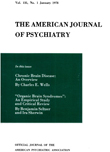Mental Illness and Susceptibility to Motion Sickness
Abstract
In attempting to explore the relationship between orienting mechanisms and behavior, the incidence of motion sickness in various diagnostic categories was determined and a meaningful diagnostic continuum was constructed. Through examination of unilateral versus bilateral seizure disturbances in one subgroup, it was possible to infer differences in interhemispheric access at the extremes of vestibular sensitivity, thus raising questions about underlying organization of brain function and behavior.
Access content
To read the fulltext, please use one of the options below to sign in or purchase access.- Personal login
- Institutional Login
- Sign in via OpenAthens
- Register for access
-
Please login/register if you wish to pair your device and check access availability.
Not a subscriber?
PsychiatryOnline subscription options offer access to the DSM-5 library, books, journals, CME, and patient resources. This all-in-one virtual library provides psychiatrists and mental health professionals with key resources for diagnosis, treatment, research, and professional development.
Need more help? PsychiatryOnline Customer Service may be reached by emailing [email protected] or by calling 800-368-5777 (in the U.S.) or 703-907-7322 (outside the U.S.).



